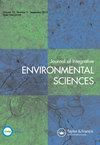Producing expertise: the Intergovernmental Science-Policy Platform on Biodiversity & Ecosystem Services’ socialisation of young scholars
IF 3.5
4区 环境科学与生态学
Q3 ENVIRONMENTAL SCIENCES
Journal of Integrative Environmental Sciences
Pub Date : 2018-01-01
DOI:10.1080/1943815X.2018.1439509
引用次数: 13
Abstract
Abstract Expert organisations, such as the Intergovernmental Science-Policy Platform on Biodiversity & Ecosystem Services (IPBES), have become increasingly important in global, regional, and local efforts to manage current environmental challenges. As producers of environmental knowledge assessments, these expert organisations are epistemic authorities in their field of expertise. To achieve and maintain epistemic authority, expert organisations constantly need to reproduce and develop their expertise. By using the first cohort of IPBES’s fellowship program as a case study, the current paper examines the production of expertise and the socialisation of new experts into expert organisations. The paper also examines the importance of these socialisation processes in the institutionalisation of expert organisations. By analyzing interviews, observations, and documents, the current study explores the expected goals, the performance, and the results of the socialisation. The study shows how the fellows learned and acquired new roles and norms. The study also shows that whoever controls the socialisation process also control the production of expertise and the institutionalisation of the expert organisation.产生专业知识:生物多样性与生态系统服务政府间科学政策平台青年学者的社会化
生物多样性与生态系统服务政府间科学政策平台(IPBES)等专家组织在管理当前环境挑战的全球、区域和地方努力中发挥着越来越重要的作用。作为环境知识评估的生产者,这些专家组织是其专业领域的知识权威。为了实现和保持知识权威,专家组织需要不断地复制和发展他们的专业知识。本文以IPBES第一批奖学金项目为例,考察了专业知识的产生和新专家进入专家组织的社会化。本文还探讨了这些社会化过程在专家组织制度化中的重要性。通过访谈、观察和文献分析,本研究探讨了社会化的预期目标、表现和结果。这项研究显示了研究员是如何学习和获得新的角色和规范的。研究还表明,谁控制了社会化过程,谁就控制了专业知识的产生和专家组织的制度化。
本文章由计算机程序翻译,如有差异,请以英文原文为准。
求助全文
约1分钟内获得全文
求助全文
来源期刊

Journal of Integrative Environmental Sciences
ENVIRONMENTAL SCIENCES-
CiteScore
3.90
自引率
0.00%
发文量
13
审稿时长
>12 weeks
期刊介绍:
Journal of Integrative Environmental Sciences (JIES) provides a stimulating, informative and critical forum for intellectual debate on significant environmental issues. It brings together perspectives from a wide range of disciplines and methodologies in both the social and natural sciences in an effort to develop integrative knowledge about the processes responsible for environmental change. The Journal is especially concerned with the relationships between science, society and policy and one of its key aims is to advance understanding of the theory and practice of sustainable development.
 求助内容:
求助内容: 应助结果提醒方式:
应助结果提醒方式:


